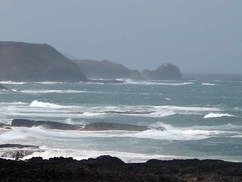
Beware the beastly easterlies, writes Linda Cuttriss, and remember they will pass.
THERE’S a howling easterly blowing across Bass Coast today. Our little house creaks. Windows strain, doors shift inside their frames. The roof shudders. The chimney wheezes and gasps. The lid of the water tank booms.
An eerie whistle trails around the corner of the house, a ghost without a home, trying to find a way in. Occasionally I hear a distant wail like the cry of a child lost deep in the bush. I try to identify the sounds flying around outside, wondering if any of them signals danger.
Through the window I see branches of trees bending back and forth, pushed and shoved without remorse. The tea-tree canopies whirl wildly round like the skirts of flamenco dancers. There are no birds bopping about in the garden today and the wallabies are lying low. Sitting inside has got me rattled. I feel trapped in a cage. I have to get outside.
I step out into the wind. My clothes flap about. My nostrils fill with salty air. Fallen leaves and twigs and sand have collected into little piles. A branch has fallen across the path but it seems there’s no damage done.
I walk to a clifftop that sits on the south coast of Phillip Island. The violent air buffets my face and drums in my ears. I stay clear of the edge in case the wind should blow me over.
The wind pulsates through tussock grasses that cover the slope of the bluff. Their wiry ends bend stiff and tense against the wind’s relentless force.
Broken white swell lines scatter the surface of the sea, pushing shoreward in short intervals from the south-east. The sea is restless, loud, hissing.
Sheets of sand sweep down the beach swirling around like flowing cream. The sand settles into parallel strands, long fingers reaching out from the dunes.
Three magpies appear in the sky close by, furiously beating their wings. They rise vertically on an updraft, wings pressed close to their bodies, then swivel sharply around, dive straight down and disappear over the edge.
I remember these easterlies from childhood days on our family farm near Inverloch. In summer they would hurtle across the dry open paddocks and batter against our house. Dad called them ‘beastly easterlies’ because they made us all cranky.
South-westerly busters might bring more damaging winds, tearing down trees and power lines, but easterly gales test even the most stoic of souls, especially when they blow for days.
When I wake in the morning to an easterly gale I feel a wave of dread. I have to remind myself that the spectacular scenery that surrounds me is framed in an open landscape, beside exposed coasts, where shelter is hard to find. I try to be philosophical and take some comfort in the fact that the beauty of this place is here every day and this wind will soon pass.
An eerie whistle trails around the corner of the house, a ghost without a home, trying to find a way in. Occasionally I hear a distant wail like the cry of a child lost deep in the bush. I try to identify the sounds flying around outside, wondering if any of them signals danger.
Through the window I see branches of trees bending back and forth, pushed and shoved without remorse. The tea-tree canopies whirl wildly round like the skirts of flamenco dancers. There are no birds bopping about in the garden today and the wallabies are lying low. Sitting inside has got me rattled. I feel trapped in a cage. I have to get outside.
I step out into the wind. My clothes flap about. My nostrils fill with salty air. Fallen leaves and twigs and sand have collected into little piles. A branch has fallen across the path but it seems there’s no damage done.
I walk to a clifftop that sits on the south coast of Phillip Island. The violent air buffets my face and drums in my ears. I stay clear of the edge in case the wind should blow me over.
The wind pulsates through tussock grasses that cover the slope of the bluff. Their wiry ends bend stiff and tense against the wind’s relentless force.
Broken white swell lines scatter the surface of the sea, pushing shoreward in short intervals from the south-east. The sea is restless, loud, hissing.
Sheets of sand sweep down the beach swirling around like flowing cream. The sand settles into parallel strands, long fingers reaching out from the dunes.
Three magpies appear in the sky close by, furiously beating their wings. They rise vertically on an updraft, wings pressed close to their bodies, then swivel sharply around, dive straight down and disappear over the edge.
I remember these easterlies from childhood days on our family farm near Inverloch. In summer they would hurtle across the dry open paddocks and batter against our house. Dad called them ‘beastly easterlies’ because they made us all cranky.
South-westerly busters might bring more damaging winds, tearing down trees and power lines, but easterly gales test even the most stoic of souls, especially when they blow for days.
When I wake in the morning to an easterly gale I feel a wave of dread. I have to remind myself that the spectacular scenery that surrounds me is framed in an open landscape, beside exposed coasts, where shelter is hard to find. I try to be philosophical and take some comfort in the fact that the beauty of this place is here every day and this wind will soon pass.